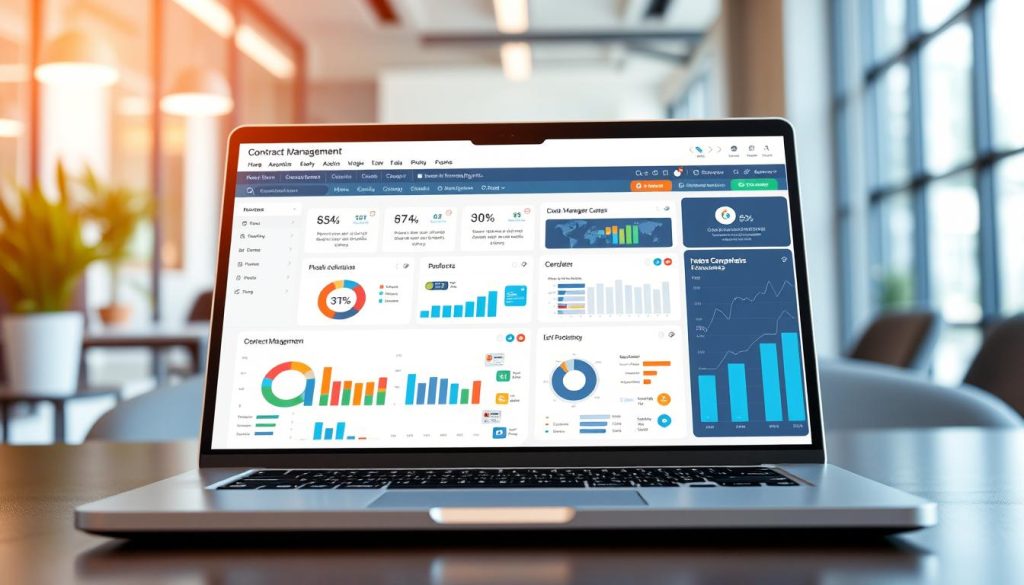In today’s complex business environment, effective contract management is crucial for optimizing operations and mitigating risks. Businesses must navigate the entire contractual cycle, from creation to expiration, to maximize results and minimize legal and financial risks.
By adopting robust contract management strategies, organizations can transform how they handle agreements and contractual relationships. This comprehensive guide will explore the entire contract lifecycle, providing actionable insights to improve your contract management processes.
Table of Contents
Key Takeaways
- Understand the importance of contract management in today’s business landscape
- Learn how to optimize your contract lifecycle
- Discover strategies to minimize legal and financial risks
- Improve your organization’s contractual relationships
- Transform contracts into strategic assets
Understanding Contract Management: Definition and Importance
In the realm of business operations, contract management plays a pivotal role in ensuring compliance and reducing risques. It is a critical process that involves overseeing contracts from initiation to completion, ensuring that all terms and conditions are met, and that the contract is executed as planned.
What Is Contract Management?
Contract management refers to the systematic process of managing contracts from their initiation through to their completion. It involves tracking and documenting all aspects of a contract, including negotiations, renewals, and terminations. Effective management of contracts is essential for ensuring that businesses comply with their contractual obligations and minimize potential risques.
Why Contract Management Matters for Business Success
Effective contract management is vital for entreprise success as it directly impacts the bottom line. Research suggests that poor contract handling can cost organizations up to 10% of their annual revenue. By implementing a robust contract management system, businesses can enhance their financial performance, improve compliance, and extract greater valeur from their agreements.
Some key benefits of effective contract management include enhanced business relationships, critical visibility into organizational commitments, and better resource allocation. By treating contracts as strategic assets, companies can gain competitive advantages and drive business growth.
The Complete Contract Management Lifecycle
Understanding the intricacies of the contract management lifecycle is vital for businesses to optimize their contractual obligations and performance. This lifecycle encompasses several stages that are crucial for effective contract management.
Contract Creation and Drafting
The contract creation and drafting phase is where the foundation of a successful contract is laid. It involves defining the terms, conditions, and obligations of all parties involved. A well-drafted contract clearly outlines the expectations and responsibilities, minimizing the risk of future disputes.
Negotiation Phase
During the negotiation phase, the terms and conditions of the contract are discussed and agreed upon by all parties. Effective negotiation requires a deep understanding of the contract’s objectives and the ability to find mutually beneficial agreements. This stage is critical for establishing a strong contractual relationship.
Contract Approval and Signature
Once the contract terms are negotiated, the contract is put forward for approval and signature. This stage involves obtaining formal agreement from all parties, making the contract legally binding. Ensuring that all stakeholders are aligned during this phase is crucial for the contract’s success.
Implementation and Monitoring
The implementation and monitoring phase is where the contract is put into action. This involves tracking key milestones, deliverables, and obligations to ensure compliance with the contractual terms. Effective management of this phase is critical for achieving the contract’s objectives.
| Stage | Description | Key Activities |
|---|---|---|
| Contract Creation and Drafting | Defining contract terms and conditions | Drafting, reviewing, and revising contract documents |
| Negotiation Phase | Discussing and agreeing on contract terms | Negotiation meetings, term revisions |
| Contract Approval and Signature | Obtaining formal agreement | Review, approval, and signing of the contract |
| Implementation and Monitoring | Executing the contract and tracking progress | Performance monitoring, reporting, and compliance checks |
Key Benefits of Effective Contract Management
By implementing effective contract management, businesses can reap significant rewards. Effective contract management is not just about signing agreements; it’s about creating valuable partnerships that drive business success.
Financial Advantages and Cost Reduction
Effective contract management helps reduce costs and ensure compliance, leading to significant financial advantages. By optimizing contract management, companies can minimize unnecessary expenditures and maximize the valeur of their contracts.
Risk Mitigation and Legal Protection
Proper contract management mitigates risks by ensuring that all contractual obligations are met, thus providing legal protection. This proactive approach helps in avoiding potential disputes and ensures that businesses are not exposed to undue risks.
Improved Business Relationships
Effective contract management fosters stronger business relationships by ensuring clear communication and mutual understanding of expectations among all parties prenantes. Regular performance reviews and proactive management of contract issues build trust and credibility with parties involved, including partners, suppliers, and customers.
Essential Contract Management Strategies for Businesses

Businesses can significantly benefit from implementing essential contract management strategies that improve contract execution and monitoring. Effective contract management is vital for ensuring that contractual obligations are met and that business relationships are maintained.
Standardizing Contract Templates and Clauses
Standardizing contract templates and clauses is a fundamental strategy that ensures consistency across all contracts. This approach reduces the risk of errors and omissions, making it easier to manage contracts. By using standardized templates, businesses can also improve compliance with regulatory requirements.
Establishing Clear Approval Workflows
Clear approval workflows are crucial for efficient contract management. By defining approval processes and assigning responsibilities, businesses can ensure that contracts are reviewed and approved in a timely manner. This helps to prevent delays and ensures that contracts are executed promptly.
Implementing Performance Monitoring Systems
Implementing robust performance monitoring systems is essential for tracking compliance with contractual obligations and identifying potential issues before they impact business operations. Key strategies include:
- Establishing clear key performance indicators (KPIs) aligned with contract objectives
- Conducting regular performance reviews to create accountability and address underperformance
- Utilizing automated monitoring tools to track delivery dates, service levels, and other measurable obligations
Effective performance monitoring not only ensures compliance but also identifies opportunities for value enhancement and relationship strengthening, ultimately supporting the overall contract management strategy.
Contract Management Software Solutions

Effective contract management is now more achievable than ever with the right software solutions. By adopting a contract management software, businesses can simplify their contract processes, from creation to archiving, without the hassle of paperwork and disorganized files.
Key Features to Look for in Contract Management Tools
When selecting a contract management tool, there are several key features to consider. Look for software that offers centralized contract storage, automated workflows, and real-time tracking capabilities. These features will help streamline your contract management process, making it more efficient and less prone to errors.
Implementation Considerations for Digital Solutions
Implementing a contract management solution requires careful planning. Successful implementation begins with a thorough needs assessment and stakeholder alignment on objectives and success metrics. Consider a phased implementation approach to avoid overwhelming your team. Additionally, plan for data migration, comprehensive training programs, and post-implementation review processes to ensure the solution meets your evolving business needs.
By carefully evaluating these factors and choosing the right contract management software, businesses can improve cooperation among teams and enhance overall contract management efficiency.
The Role of Contract Managers in Your Organization
Contract managers are the linchpins that hold together the complex process of contract management. They oversee the entire lifecycle of a contract, from initiation to closure, ensuring that all terms and conditions are met.
Responsibilities and Required Skills
A contract manager’s responsibilities include drafting and negotiating contracts, managing contract execution, and monitoring compliance. To perform these tasks effectively, contract managers require excellent communication and negotiation skills, as well as the ability to analyze complex data and make informed decisions.
As stated by a contract management expert, « A good contract manager can transform a contract from a mere document into a strategic asset that drives business growth. » This highlights the importance of having skilled contract managers who can effectively manage contracts and drive business value.
How Contract Managers Drive Business Value
Contract managers drive business value by identifying optimization opportunities across the contract portfolio, resulting in significant cost savings and revenue enhancements. They facilitate collaboration between departments, provide early warnings of potential issues, and help organizations make informed decisions about business relationships.
- Skilled contract managers transform contracts into strategic assets that drive business growth and competitive advantage.
- By optimizing contract portfolios, contract managers can unlock significant cost savings and revenue enhancements.
- Contract managers facilitate collaboration between departments, ensuring that all stakeholders are aligned.
Managing Contract Risks Effectively
Managing contract risks is a critical aspect of business operations that requires careful planning and execution. Contract managers play a vital role in identifying, assessing, and mitigating risks associated with contracts.
Identifying Common Contractual Risks
Contractual risks can arise from various sources, including ambiguous contract language, non-compliance with obligations, and disputes between parties. Clear contract language is essential to avoid misunderstandings and ensure that all parties are aware of their obligations.
- Unclear or ambiguous contract terms
- Non-compliance with contractual obligations
- Disputes between parties
Preventive Measures and Safeguards
To mitigate contractual risks, businesses can implement various preventive measures and safeguards. These include proactive monitoring of contract performance, maintaining comprehensive documentation, and establishing clear procedures for addressing disputes.
| Preventive Measures | Benefits |
|---|---|
| Proactive monitoring | Early identification of potential breaches |
| Comprehensive documentation | Strengthens position in disputes |
| Clear dispute resolution procedures | Efficient resolution of disputes |
Handling Disputes and Breaches
Despite preventive measures, disputes and breaches can still occur. In such cases, a balanced approach is necessary to resolve the issue while preserving valuable business relationships. Alternative dispute resolution mechanisms, such as mediation and arbitration, can be effective in resolving disputes without resorting to litigation.
« Effective dispute resolution begins with clear contract language that establishes agreed procedures for addressing disagreements. »
By understanding contractual risks and implementing effective risk management strategies, businesses can minimize potential losses and ensure successful contract execution.
Contract Management Best Practices
Effective contract management is built on a foundation of best practices that help organizations navigate the complexities of contractual agreements. By adopting these practices, businesses can ensure that their contracts are well-managed, risks are mitigated, and relationships with contractual parties are optimized.
Centralized Contract Repository
Maintaining a centralized contract repository is essential for ensuring that all contracts are stored in a single, accessible location. This practice enables easy retrieval of contracts, reduces the risk of lost or misplaced documents, and facilitates better management of contractual obligations. By having all contracts in one place, organizations can more effectively monitor their contractual commitments and parties prenantes.
Regular Contract Reviews and Audits
Conducting regular contract reviews and audits is crucial for ensuring compliance with contractual terms and identifying potential issues before they become major problems. This practice involves systematically examining contracts to verify that all termes contrat are being met and that any discrepancies or areas of concern are addressed promptly. Regular reviews also help in maintaining alignment between contract managers and business owners throughout the contract lifecycle, ensuring that all parties are informed and aligned.
Stakeholder Communication Strategies
Effective stakeholder communication strategies are vital for ensuring that all parties understand their contractual obligations and the consequences of non-compliance. This involves tailoring communication approaches to different stakeholder groups to improve engagement and information retention. By maintaining transparent communication about contract performance, organizations can build trust and facilitate collaborative problem-solving when challenges arise, ultimately ensuring that all parties work together effectively ensemble.
Measuring Contract Management Success

Measuring the success of contract management is vital to understand its impact on the organization. Effective contract management processes ensure that contracts are executed efficiently and contribute to the overall success of the business.
Key Performance Indicators (KPIs)
To measure contract management success, organizations should establish relevant KPIs. These may include metrics such as contract cycle time, compliance rates, and contract value realization. By tracking these KPIs, organizations can identify areas for improvement and optimize their contract management processes.
- Contract cycle time
- Compliance rates
- Contract value realization
Continuous Improvement Processes
Continuous improvement is essential for contract management success. This involves regularly reviewing contract management processes
- Systematic collection and analysis of performance data
- Regular review cycles to examine individual contracts and overall contract management system
- Feedback loops to refine processes and templates
- Benchmarking against industry standards and best practices
- Regular evaluation of technology enhancements
By implementing these strategies, organizations can ensure that their contract management processes remain effective and efficient, contributing to the overall success of the organisation throughout the contract cycle vie.
Digitalization and the Future of Contract Management
The digitalization of contract management is revolutionizing how businesses handle contracts. Digital contract management solutions allow you to simply and securely manage all stages of a contract’s life cycle (cycle vie) thanks to features such as creation assistance, validation (workflow), electronic signature, automatic reminders, and monitoring of contractual commitments.
By implementing a digital solution, businesses can put in place (mettre place) a comprehensive system that streamlines contract management. This not only enhances efficiency but also reduces the risk associated with manual processes.
Artificial Intelligence and Automation Trends
Artificial intelligence (AI) and automation are significantly impacting contract management. AI can help in drafting contracts, while automation can ensure timely reminders and updates. A logiciel gestion (contract management software) that incorporates AI and automation can greatly simplify the process.
| Feature | Benefit |
|---|---|
| Creation Assistance | Simplifies contract drafting |
| Electronic Signature | Reduces signing time |
| Automatic Reminders | Ensures timely updates |
Preparing Your Business for Digital Transformation
To successfully implement digital contract management solutions, businesses must start with a clear strategy aligned with their overall objectives. Assessing current maturity levels helps identify areas for improvement. As noted in a recent article on the impact of AI on freelancing, change management is critical for successful digital adoption.
- Establish a clear strategy
- Assess current maturity levels
- Implement change management
- Plan for integration
- Implement a phased approach
Conclusion: Transforming Your Business Through Strategic Contract Management
In today’s business landscape, effective contract management emerges as a crucial element for companies aiming to enhance their operational efficiency and strategic positioning. By adopting a proactive approach to gestion de contrats, businesses can not only ensure legal and regulatory compliance but also stimulate sustainable growth.
Strategic contract management represents a transformative opportunity for businesses to convert contractual relationships from administrative burdens into competitive advantages. The evolution toward digital contract management solutions offers unprecedented capabilities for efficiency, insight, and value creation from contractual relationships.
By implementing the strategies outlined, organizations can realize significant benefits, including cost reduction, risk mitigation, and relationship enhancement. As business environments grow increasingly complex, contract management will become an even more critical differentiator between market leaders and followers.
FAQ
What are the primary benefits of implementing a contract management system?
By implementing a well-structured contract management process, businesses can enjoy several benefits, including reduced risks, improved compliance, enhanced collaboration, and increased financial savings. Effective contract management enables organizations to better manage their contractual obligations, resulting in stronger business relationships and improved overall performance.
How can I ensure compliance with contractual obligations?
To ensure compliance, it is essential to establish a robust contract management process that includes regular contract reviews, performance monitoring, and clear communication among stakeholders. By doing so, businesses can identify potential issues early on and take corrective actions to mitigate risks and maintain compliance.
What are the key features to consider when selecting a contract management software?
When choosing a contract management software, consider features such as centralized document storage, automated workflows, customizable templates, and robust reporting capabilities. The software should also provide real-time visibility into contract status, enable effective collaboration, and integrate with existing systems to ensure seamless implementation.
How can contract managers drive business value?
Contract managers play a vital role in driving business value by ensuring that contracts are properly managed throughout their lifecycle. They achieve this by negotiating favorable terms, monitoring performance, mitigating risks, and optimizing contractual obligations to achieve business objectives.
What are some common contractual risks, and how can they be mitigated?
Common contractual risks include non-compliance, disputes, and financial losses. To mitigate these risks, businesses can implement preventive measures such as thorough contract review, clear communication, and regular monitoring. By identifying potential risks early on, organizations can take proactive steps to minimize their impact.
How can businesses measure the success of their contract management processes?
To measure the success of contract management processes, businesses can establish key performance indicators (KPIs) such as contract compliance rates, cycle time reduction, and cost savings. Regularly reviewing these KPIs enables organizations to identify areas for improvement and optimize their contract management processes to achieve better outcomes.





